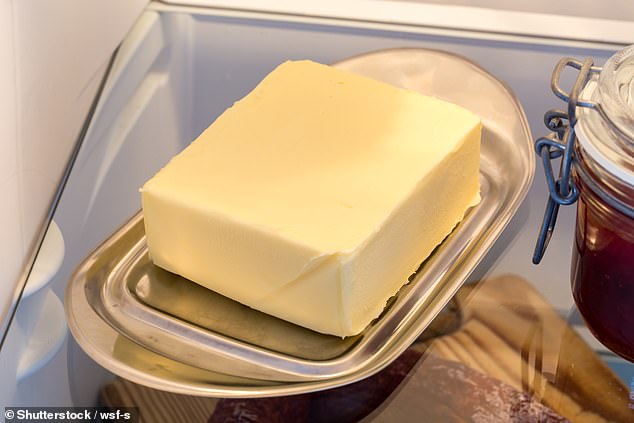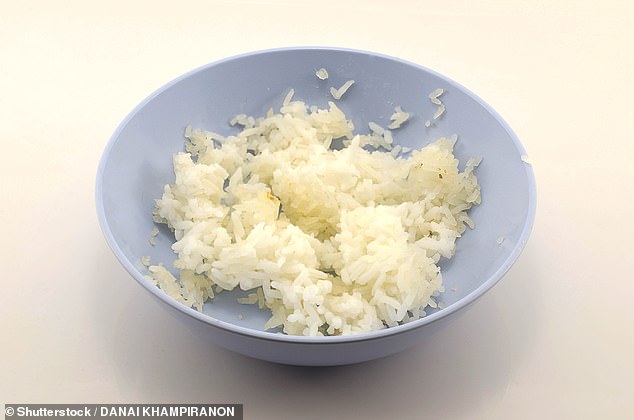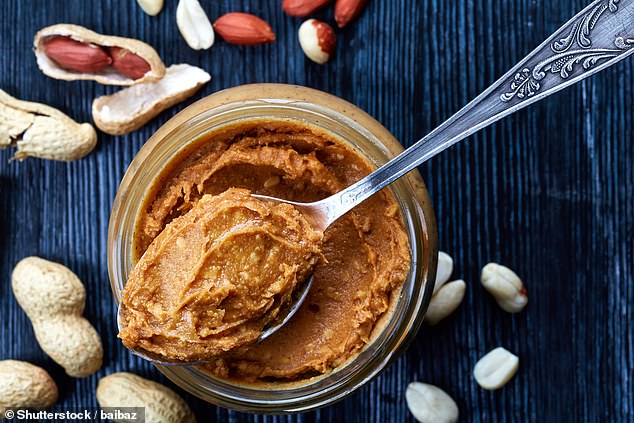It’s something that most of us do without thinking twice.
But next time you’re unpacking your groceries from the supermarket, you might want to reconsider where you store your items.
Food researchers from Two Wombats have revealed the surprising foods that you should be keeping in the fridge.
‘It’s obvious that produce like fresh meat, fish and dairy should be kept in the refrigerator,’ they explained.
‘But there are other ingredients that you might be surprised to learn you’ve been storing incorrectly.’

Where do you store these ingredients? Surprisingly, among those best stored in the fridge include nuts and wholegrain flour
1. Ketchup
Many people mistakenly believe that ketchup should be stored on the cupboard shelf, much like how it is in the supermarket.
However, once it’s opened, the experts say that ketchup should be stored in the fridge.
‘While unopened and sealed, it is fine to store in the pantry,’ they explained.
‘But once opened, it’s best to store it in the fridge to maintain its natural acidity level, flavour, smell, and colour.’
2. Corn on the cob
If you’re stocking up on corn on the cob for your next BBQ, it’s best to keep this in the fridge.
‘If you refrigerate corn on the cob immediately after purchasing, it will greatly slow down the conversion of its sugars into starches,’ the experts said.
‘This will maintain its natural sweetness and crisp texture for a longer period.’

It’s technically fine to store butter on the kitchen table. However, if you want to prolong the freshness and improve the flavour, it’s best to keep it in the fridge
3. Wholegrain flour
One of the most surprising items on the list is wholegrain flour.
While other flour types are typically stored in the cupboard, wholegrain flour has a higher oil content, so can go rancid if kept at room temperature.
‘The freshness and flavour can be preserved by cooling it, making it perfect for baking,’ the experts said.
4. Butter
It’s technically fine to store butter on the kitchen table.
However, if you want to prolong the freshness and improve the flavour, it’s best to keep it in the fridge.
‘The best way to keep butter spreadable and fresh is to take out just enough for mealtime and leave it out of the fridge about an hour before use so it can soften properly,’ the experts said.

If you’ve got leftover rice, it might seem harmles to leave it out on the counter. However, this can actually lead to food poisoning, according to the experts
5. Tortillas
If you regularly buy tortillas, you may have noticed that they turn mouldy annoyingly quickly.
To rectify this issue, the experts suggest keeping your tortillas in the fridge.
‘Tortilla packs are highly sensitive to temperature changes, which can create moisture and lead to moulding,’ they explained.
‘When you store them in the fridge, corn tortillas can last up to eight weeks, flour tortillas for up to four, and homemade tortillas for seven days instead of the usual two or three.’
6. Nuts
If you plan to consume nuts within a month of buying them, it’s fine to keep them in your pantry.
However, if you want to keep them fresh for longer, it’s best to keep them in the fridge.
‘The unsaturated fats in nuts are delicate and can quickly turn rancid, affecting their natural flavour and making them less enjoyable,’ the experts said.
7. Natural peanut butter
From Pip & Nut to Meridien, natural peanut butters are now hugely popular in the UK, thanks to their basic ingredients and lack of stabilisers.
As with nuts, if you’re going to consume your natural peanut butter within a few weeks, you can store it in the pantry.
However, if you’re planning to keep it for longer, it’s better to keep it in the fridge, according to the experts.
‘Unlike conventional peanut butter, natural variants don’t contain stabilisers, so chilling them helps keep the spread smoother and fresher for longer,’ they explained.
‘To prevent natural peanut butter from separating, stir it and store it in the fridge upside down.’
8. Cooked rice
If you’ve got leftover rice, it might seem harmles to leave it out on the counter.
However, this can actually lead to food poisoning, according to the experts.
‘All varieties of uncooked rice can contain Bacillus cereus spores, a bacterium that can cause gastrointestinal illnesses like vomiting or diarrhoea,’ they said.
‘These spores are heat-resistant and survive even after cooking.

From Pip & Nut to Meridien, natural peanut butters are now hugely popular in the UK, thanks to their basic ingredients and lack of stabilisers. As with nuts, if you’re going to consume your natural peanut butter within a few weeks, you can store it in the pantry
‘To prevent the growth of bacteria, it’s recommended to divide large batches of rice into smaller portions and allow them to cool faster by spreading them out on a shallow tray before storing them in the fridge.
‘This method reduces the risk of bacterial growth and prevents the rice from becoming overly clumpy or mushy when reheated.’
9. Jam
Because of its high sugar content, you might think jam is safe to store in the cupboard.
However, once it’s opened, mould and fermentation can quickly occur.
‘Once you pop the lid off the jar, it’s time to put it in the refrigerator,’ the experts said.
‘Using a clean spoon each time you scoop out the jam can significantly extend its shelf life. Additionally, storing the jam in the fridge immediately after each use will help prevent mould formation and maintain its quality.’
10. Yeast
It’s a vital vital ingredient in many baked goods, but yeast is highly sensitive to environmental changes.
Unopened, it can be stored in a cool, dry place, but refrigeration is highly recommended once opened.
‘The lower temperatures in the fridge help preserve the yeast’s activity and prevent it from dying off, ensuring that it remains adequate for your baking need,’ the experts added.
‘Once you open a can of yeast, it is crucial to transfer any unused yeast to an airtight container before placing it in the refrigerator.
‘This prevents moisture from deactivating the yeast. When stored properly, yeast can maintain its activity for about 4 to 6 months after opening.’










